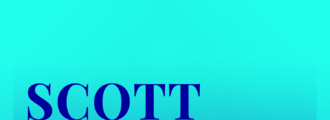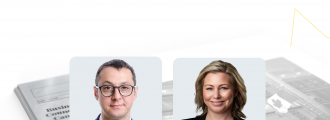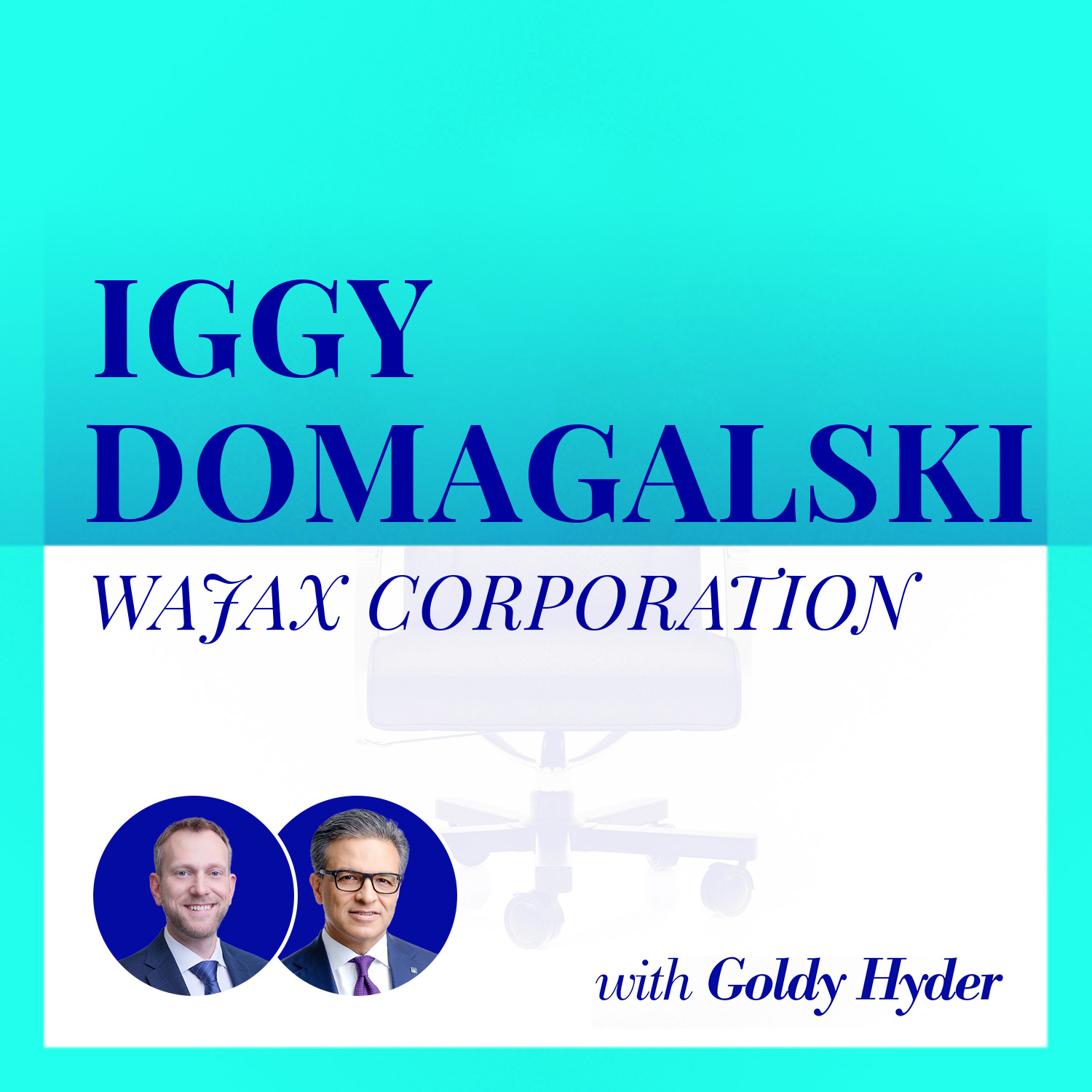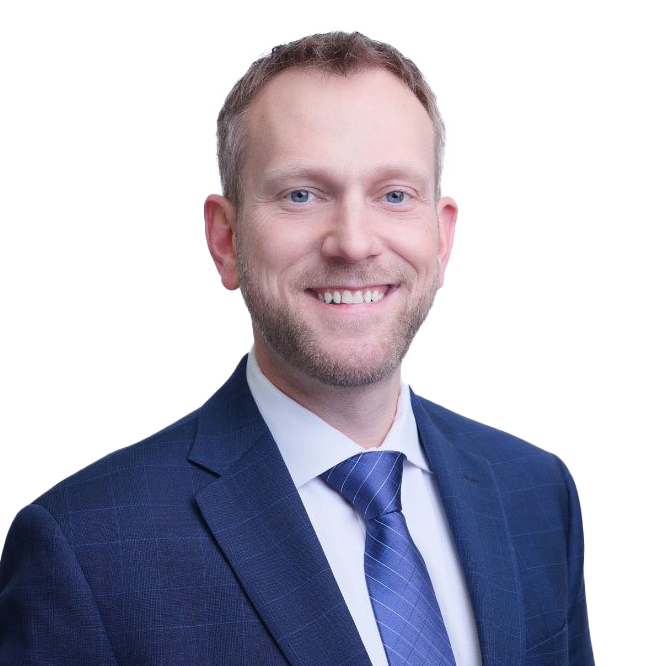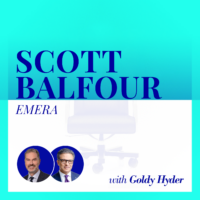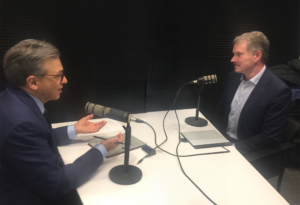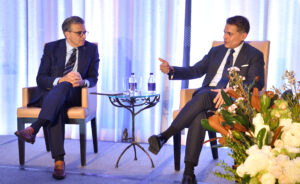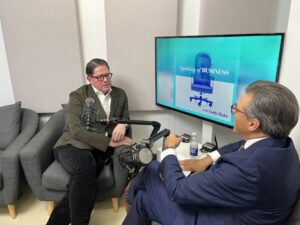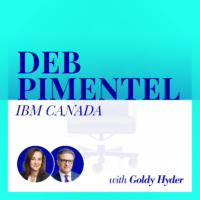Iggy Domagalski is a big believer in having fun at work. “Work can be enjoyable,” he says. “When people know that they can have a bit of fun and that they can take five minutes to spend some fun time with their peers, I think that sends them back to their desk smiling.”
Domagalski is the President and CEO of Wajax, a Canadian industrial products and service company. With 3000 employees working in 120 branches across the country, a strong corporate culture that embraces positivity is a big priority for him. That’s why you might run into a foosball table or an impromptu basketball game at a Wajax office.
“You spend more than half your waking life with your teammates at work,” he says. “Why can’t that be enjoyable?”
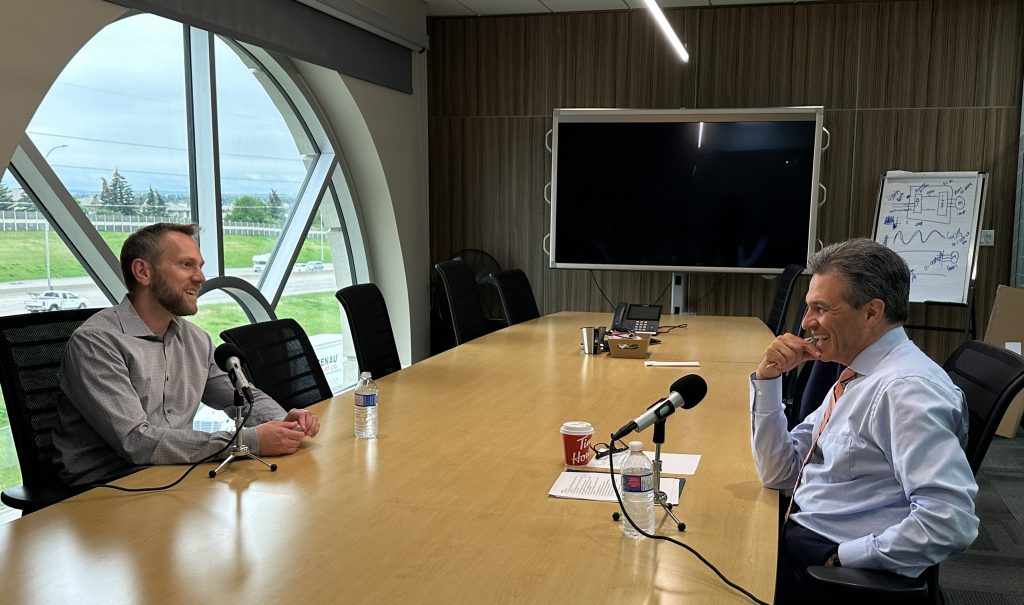
Domaglaski believes happiness and fulfillment at work can permeate into the larger community. “Business can be a real power for good.”
In a wide-ranging conversation with Goldy Hyder on the Speaking of Business podcast, Domagalski discusses his approach to leadership, how he embraced entrepreneurship at an early age, the importance of mentors and why Wajax is dedicated charitable giving.
Iggy Domagalski:
I think any person who leads a company should look at themselves in the mirror every day and be thankful that they have the opportunity to do that, and that they have the opportunity to hopefully, positively shape the lives of the people that work there, and their families, and the communities that surround those people. For me, that’s the way I think about it. I think of it as an honor and a privilege.
Goldy Hyder:
Welcome to Speaking of Business, conversations with Canadian innovators, entrepreneurs, and business leaders. I’m Goldy Hyder, President and CEO of the Business Council of Canada. It’s almost summer in Canada and swimming season is upon us. Maybe that’s why the phrase “jumping in with both feet” keeps coming to mind when I think about my guest today. After all, Iggy Domagalski’s career is full of examples of doing just that. As a teenager, he started his own online company. During university, he ran a painting franchise. In his 20s he and a friend bought Calgary-based Tundra Process Solutions growing the company from 14 to 150 employees. Then just a year and a half ago, after Tundra was bought by Wajax Corporation, Iggy became the company’s new president and CEO and suddenly he was in charge of 3000 employees who were spread all across the country. Talk about jumping in with both feet! I’m delighted to be in Calgary today to speak with Iggy. Welcome to the podcast, Iggy.
Iggy Domagalski:
Thanks, Goldy, it’s my pleasure to be here.
Goldy Hyder:
Well, I hope you feel that way when it’s all over. Look, let’s just get to the big question I’m sure people are saying is, what is Wajax?
Iggy Domagalski:
Wajax is one of Canada’s longest-standing and most diversified industrial products and service companies. We were founded in 1858-
Goldy Hyder:
Before the country.
Iggy Domagalski:
Which means that we are nine years older than Canada, we’re 165 years old. It is a company that has just tended to fly under the radar. We’ve got 120 branches across the country in pretty much every community. 3000 people that serve over 30,000 customers. But we’ve never really been particularly loud or vocal about telling our story to the world.
Goldy Hyder:
You’re older than Canada but you’ve got the ultimate Canadian trait, keep the expectations low.
Iggy Domagalski:
Absolutely. We are a humble, understated company.
Goldy Hyder:
Well, there’s nothing wrong with that. I mean, you’re certainly successful. One of the things that I like to talk about is purpose, a company’s purpose. It’s stated that for Wajax it’s empowering people to build a better tomorrow.
Iggy Domagalski:
Yes.
Goldy Hyder:
So what exactly does that mean to you?
Iggy Domagalski:
I think that the journey of how we got there is important. The company’s 165 years old. Prior to me getting here, just not very long ago, we didn’t have a company-stated purpose or a set of core values. And for me, leading with a clear purpose that people are passionate about and a set of core values is pretty important and I think that really drives great performance.
Goldy Hyder:
Did you have that at your previous company?
Iggy Domagalski:
Absolutely. At our previous business, Tundra Process Solutions, we had a clear purpose, clear set of values that we lived by, we hired by, we fired by, and that was what really I think united us in what we were doing and that really helped our growth. So when I got to Wajax and there wasn’t one that made me pretty excited because I thought we’ve accomplished so much, and it’s a great company with wonderful people, and imagine what we could do if we had this in place.
That purpose, that’s not something that I came up with, that’s not something that our couple corporate managers came up with, we actually went to our front lines. And ultimately we’ve engaged over a third of our people so we’ve engaged 1100 people in this discovery process of what is our purpose and what are our core values. That statement empowering people to build a better tomorrow, that’s come up from our front lines and that’s what our people are passionate about. It’s OUR purpose. I mean, when you think about a company that you’d want to work at I mean, I want to empower people, I want to be empowered, I want to build a better tomorrow. That sounds pretty good. And I think our company does that. We’re an industrial company. I like the fact that we actually-
Goldy Hyder:
What kinds of things do you make?
Iggy Domagalski:
We’re a distributor, and servicer, and value-added fabricator of industrial equipment. We work on things as small as a $10 bearing that might go into a facility or we’ll sell a $20 million mining excavator that is used in the oil sands or in a mine up north. There’s a lot of different pieces and we’re really, really diversified, probably Canada’s most diversified industrial company. We’re a part, I think, of something real. The equipment that we put out there that we fix and that we make better, that’s used to build Canada. We’re a Canadian-only company publicly traded on the TSX and so we’re just … We’re quite proud to be Canadian and building Canada.
Goldy Hyder:
Tell me about sort of your career journey, if you will. You became CEO of Wajax only a year and a half ago. How did you get here?
Iggy Domagalski:
I think it’s been a pretty fun journey. I’ve always really loved business, and I think that probably came from my folks. My parents and me immigrated to Canada when I was a little kid so I was born in Poland. They were always entrepreneurs their whole life. Engineers by trade but entrepreneurs for most of their working life. When we came to Canada that’s what they did, they were entrepreneurs. And so they ran craft stores where we sold pottery and other things. That was the conversation that was around the kitchen table and it was always something that I think I identified with. I liked the idea of business I thought it was really interesting and really multifaceted. So that’s what I went to university for. I got a business degree at the University of Manitoba, the Asper School of Business.
Then went to work in corporate finance for five years which was a cool experience. I was lucky to be chosen in this management development program at a company called Investors Group, the big mutual fund company in Canada. And that was really great because I got to see all the different pieces of the business. I did a six-month rotation in sales, and six in operations, and six months on the trading floor, and six months in training, and really got a good sense of all the various areas of a business. And although that was a mutual fund company it’s … All business really is quite similar. I mean, we were just manufacturing mutual funds as opposed to industrial equipment, but all the other elements were very, very similar.
At the end of about five years in that financial services corporate finance career, I had the opportunity to move out west with a mentor of mine who’s been a mentor, and a friend, and a business partner for the past 20-plus years, and we went on an adventure to buy some companies which was super exciting. I’d always thought I would live in Winnipeg for my whole life but this exciting opportunity came up to move west. Moved to Vancouver for a few years. Our first business was a small air compressor manufacturing company which I had the privilege to run for a few years. And then we bought Tundra which is the company that I really spent most of my time at. Actually today, as of this recording, it’s my 15th anniversary with the company-
Goldy Hyder:
Oh, nice, congrats.
Iggy Domagalski:
Which was pretty cool. I got an email pop-up this morning.
Goldy Hyder:
It started with just you and someone else and built it up.
Iggy Domagalski:
It was me and a partner, that we moved here, and it was already an existing business.
Goldy Hyder:
I see, so you bought them.
Iggy Domagalski:
Our model was to buy a business and then try to grow it as fast as we could, and that’s what we did with Tundra. It was a wonderful success story. I think over the time that we were here we grew it close to 30% a year for over a dozen years. That was just a ton of fun. The company’s headquartered in Alberta. We were a small private company so you can do all sorts of fun things, a lot of great customer events. We really had a big focus on culture and really trying to make the workplace enjoyable. Still lots of accountability and hard work. You spend more than half your waking life with your teammates at work and why can’t that be enjoyable? And I think along the way we discovered that … We think business can be this really good power for good or bad, but in our view, we thought it could be a really good power for good in that-
Goldy Hyder:
Well, if you’re bad you probably won’t last. The customer will ween you out.
Iggy Domagalski:
And the way that we thought about good was around our people. We always knew we were going to do a good job for our customer, but if we were able to send our people home fulfilled and happy and not anxious and not angry that they would go home and they would treat their families better, and they would treat their friends better, and that would permeate into the community. So that was something that we really found a big passion about and really built our business on that.
Goldy Hyder:
You said a number of sort of strands that I want to explore here. And I want to start actually with your parents. I’d read that they both had engineering degrees.
Iggy Domagalski:
Yes.
Goldy Hyder:
But as you just mentioned, when they came here it didn’t sound like they were in engineering. Did they run across what immigrants I guess run across now still which is the foreign credentials issue? Is that still a problem? Was it a problem for them I guess first of all?
Iggy Domagalski:
It was definitely a problem for them. So my dad was able to get a job in an architecture firm but not as an engineer just as somebody who was drafting.
Goldy Hyder:
So underutilized. We talk about productivity, there’s a great answer.
Iggy Domagalski:
And my mom too. She had a Master’s in civil engineering and was able to get a job in what I think was ultimately a soap factory assembling soap into little bags and stapling it together.
Goldy Hyder:
When she could’ve done a lot more.
Iggy Domagalski:
Exactly. So they did that for a short period of time. And I think they did what all immigrants had to do is put some food on the table, and save up some money, and then they branched out on their own and started to run some businesses.
Goldy Hyder:
The other thing you mentioned was the role of mentors and you had a great mentor. Tell me more about the importance of mentorship and how you’re helping your own employees in that regard.
Iggy Domagalski:
I think I was so lucky that I met a really, really wonderful mentor at an early age. The gentleman’s name is Mike. He hired me-
Goldy Hyder:
So was mine by the way.
Iggy Domagalski:
Mike hired me right out of university so I was still … I didn’t even complete my last year. I got hired into that rotational program, but it was the summer before I graduated, and we just really connected. He was leading the company that I ended up working at. I think I was lucky that we just had that connection and have really had a wonderful connection for the last 20-plus years. He’s been a mentor, a boss, a business partner, and a friend too. I mean, we’ll take family vacations together.
Goldy Hyder:
Nice.
Iggy Domagalski:
He’s about 20 years older than me but I’m friends with his kids and he knows my kids. I think if you’re lucky enough to find a mentor along the way that you really, really click with who really believes in you and can help you along the way. And importantly also, put you into roles that you might not necessarily be ready for.
Goldy Hyder:
Tell me something he helped you with where it was identified by him as a weakness of yours but he helped you.
Iggy Domagalski:
I think Mike and I complimented each other really well. He was the gas pedal. He’s a-
Goldy Hyder:
Go.
Iggy Domagalski:
Growth, growth, growth no matter what. And I was not the break but the … Just checking the gas and making sure that we’re pressing the gas at the right times. And so I think we really balanced each other.
Goldy Hyder:
Not flooding it.
Iggy Domagalski:
Exactly. So I think he pushed me to be more aggressive and I pushed him to be a little more thoughtful around some of the growth decisions.
Goldy Hyder:
Do you get to where you are today if he hadn’t done that?
Iggy Domagalski:
I do not think I would be where I am today without Mike’s support for sure so I was just lucky to have that mentor. I think over the years I’ve built a group of other mentors. I would say I probably have 10ish that I rely on quite constantly. These are folks that are more senior than me, that have done more interesting things, that are older than me that I’ve reached out to and just tried to curate a bit of relationship which is usually me just peppering them with questions.
Goldy Hyder:
Well, I’m going to pepper you with more questions. You mentioned the notion of business as doing good. Why is it that in Canada it seems that businesses struggle to get that brand out that says, “For everybody that’s out there for the worker where do the workers work, and who’s investing in their careers, and who’s developing their skills, and who is giving them opportunities?” What is it about business that you think is a drag in the Canadian perception and what can we do about it? I’m asking you all the easy questions today.
Iggy Domagalski:
Well, it sounds like we’re just solving the world’s problems here. Business can definitely get a bad name. If we did something really good around developing a whole bunch of people and helping them with their careers or treating them really well during times of hardship or times of happiness … And I think when, as an employer, you can do a great job for people, but when they’re having their real hardships, which is usually illness and death in the family, you can really step up. And when they’re having their moments of greatest happiness, which is usually marriage and children, that you can really step up and do something good. But if we do that that’s never making a newspaper nor would we want it to.
If a business lays off 50 people, that’s making the newspaper. Or lays off 100 people, that’s making the newspaper. It’s the negative stories that get out there that businesses have to, unfortunately, go through those things. Only the negative parts really seem to be captured. And perhaps as Canadians we are … We’re loathe to toot our own horn about some of the really good things that we do so we don’t talk about that. I can say that our company’s probably an example of that. We do a lot of great things that we just … It’s our Canadian way to not shout it from the rooftops.
Goldy Hyder:
I mean, I guess it’s a question of whether you think it’s the right way or the wrong way, but part of that answer has to come with how the world is shaping up. The world’s a really competitive place. Should we adjust our culture maybe up a notch to … Don’t flood the car but don’t also say, “Hey, let’s be worried about running out of gas all the time either.”
Iggy Domagalski:
As the world seems to have become smaller and more connected I think you have to adapt to the world. I do think that Canada and Canadian business can do a little bit of a better job of just tooting our own horn. And I think that’s what this podcast and the organization that you run are trying to do, it’s to shine a light on the good that’s happening in business. Anyone in this country or any country can pick up a newspaper and learn about all the bad, that’s very easy to do.
Goldy Hyder:
As they say, they don’t report safe landings.
Iggy Domagalski:
Absolutely.
Goldy Hyder:
Right? The other word that I wanted to pick up on is you spoke of fun. I’m a big believer that a workplace must be fun. And it sounds corny or hokey at times to people but yet here it is right in your culture. Your culture is about communications, trust, and fun. How does that go over in the company?
Iggy Domagalski:
I think it goes over pretty well. I mean, when-
Goldy Hyder:
Well, you and I just played … No one knows this because it’s a podcast, but you and I were-
Iggy Domagalski:
Were just playing basketball over there.
Goldy Hyder:
We were just playing basketball outside the office here because he’s got this little mini carnival machine. Anyhow, both of us need work on that.
Iggy Domagalski:
Absolutely. We were not very good. I do think that culture is about more than just foosball tables, and pizza parties, and basketball games but I think those things are nice. You can have a good workplace where you have to do a lot of the right things. I think you have to care for people, you have to compensate them fairly … I guess you don’t have to but it’s nice when you have a workplace that is psychologically safe where people feel that they can speak up to their leaders and not be reprimanded for it.
Goldy Hyder:
That’s what you mean by trust?
Iggy Domagalski:
Yeah. And I think there has to be good communication. And there has to be a whole bunch of things for a business to be successful. But when you layer on top of that just a little bit of fun it makes it enjoyable. And work can be enjoyable and it doesn’t have to be pizza parties every day. When people show up and they know that they can have a bit of fun and that they can take five minutes to go play on basketball or play foosball and spend some quality time, fun time with their peers, I think that sends them back to their desk smiling. I think that piece is important. And sometimes it’s just missing. And it’s not like it’s very expensive to do or it’s very complicated to do.
Goldy Hyder:
The flip side of the fun is … One of the issues that seems to be a very big preoccupation in the C-suites right out of COVID, and during COVID, is the issue of mental health. And I know that’s a very big focus for you. Why is that the case?
Iggy Domagalski:
COVID was such a challenging time. But even before COVID mental health was a massive challenge. About six or seven years ago, Wajax had a short period of time where four of our people died by suicide, and it all happened really, really quickly. We thought, “Wow, that is really, really not good.” As an employer, we do a lot for safety. We really invest a lot in making sure that people don’t cut themselves or break their arm or fall off of something, but there’s a lot more to safety than that. There’s the mental health and the mental safety, and what can we do around that? And so we started on this journey to really invest in mental health, and we’ve implemented almost all the tools that you can to give people that.
Last year we won a few awards from Excellence Canada for mental health in the workplace and for supporting our people. And I think it’s made a real difference. I do think we’ve got a long way to go getting those resources out more to the front lines so the people that might need them the most is still continues to be a challenge. When we talk to other companies that’s their challenge as well. We just think it’s so important and it’s a topic that is fortunately starting to get talked about a lot more. I mean, we are just an employer and so I don’t know that we can do as much as a family, but we can certainly do something, and I think we can do a meaningful amount, and we really try to because of some of these unfortunate experiences that we had.
Goldy Hyder:
I’m really sorry to hear that. It’s unfortunate. It’s happened more than just here. And so also one of the reasons I think many companies are trying hard to create an opportunity for employees to return to the office and return to their workspace. Has that been an issue for you?
Iggy Domagalski:
We definitely have some folks that are still working at home. When we look at our company, between 2/3 and 3/4 of our people never left the front lines so there are-
Goldy Hyder:
But you’re an essential service effectively.
Iggy Domagalski:
We are an essential service. Of our 3000 people, 1000 are technicians either in the shop or in the field so they’re turning wrenches and fixing things and you can’t do that from home. And then another 1000 are … They’re frontline people. They’re the people that take your order at the order desk, they’re the people that work in the warehouse and move the product around. So 2/3 of our people never left the front lines. And we really owe them a debt of gratitude because them, along with the other 2/3 of Canadians, about 2/3 of Canadians, also never left the front lines. The rest, we’ve started to have many people come back to the office. We haven’t fully mandated it yet for some folks. There are some people who just work way better at home and they’ve figured out a routine. Some people have moved to different places, completely out of major cities, and they just absolutely love working from home and so we’ve tried to honor that.
Many of our other groups, we have some variations of core days where they can come in. I personally work hybrid. I live in Calgary. When I’m in Calgary I’ll often be working from home just because I’m on meetings online all day with people who live in all the corners of our country. But I also spend a ton of my time in our head office in Mississauga and in all of our branches across the country. I work hybrid and it works for me. So I think it works for a lot of our people and it seems to work for our team. And because of our distributed nature, even before the pandemic, we were pretty good at doing the remote thing.
Goldy Hyder:
We were talking about mental health, but it’s not the only thing you’re involved in. I’ve seen a number of charities include a focus on cancer. In addition to that, Wajax has also been a company that’s been very supportive of the food banks in Canada. Tell me about those. And again, what drove you into those particular causes?
Iggy Domagalski:
When I came to Tundra, which would’ve been 15 years ago today, we did not have a philanthropic bone in our body. I think we might’ve given $200 to one of our salesman’s hockey teams, to their kids’ hockey team. But over the years we built a culture in that company of giving back. And in fact, it’s one of the core values of that company, give back. When I would interview people, even just a couple years ago, and ask them why they wanted to join the company, 100% of the people, not 99, 100% of the people said that one of the reasons was they loved what we did in the community and they wanted to be a part of that. We never did it for business reasons, we did it because we thought it was the right thing to do and because we wanted to support the communities that were so supportive of us. And we just knew that there was a lot of people out there that needed help. But it turned into this wonderful recruiting tool, and I think it was a wonderful-
Goldy Hyder:
It’s a win-win.
Iggy Domagalski:
It turned out to be this wonderful thing that we did. And then when I came to Wajax we immediately started on a journey to pick a couple charities that we really wanted to support. We sent out a survey to all our people and said, “What do you care about?” The two themes that really jumped out were cancer. One out of two Canadians will get cancer so that’s a lot. And so it has affected everybody in this country in one way or another. The other thing that our people were passionate about was, we think it’s wrong that people in this country still go hungry. So those were the two that we chose. We chose them because they were national, they had a footprint where most of our branches were so we thought we could really get our people involved which was important to us too to be able to be involved with these charities. Both Food Banks Canada and Canadian Cancer Society have been just wonderful partners of ours.
Goldy Hyder:
Let’s come back a little bit to talk about culture again because I want to take what you’ve learned and see if we can’t share it with some of our listeners. So Wajax is a huge operation, I mean, you’ve got 3000 employees but they’re in 100 locations across the country. How do you keep connected to your employees?
Iggy Domagalski:
I would say that actually visiting our branches is probably one of my favorite things to do. I love getting out to our front lines, learning about our business, shaking people’s hands, and just spending time with them. So I’ve been out to, it’s got to be getting close to 3/4 of our branches now. I’m on the road a lot. But I think spending time out there talking about our purpose and our values is something that’s pretty important, and at the same time, learning from our folks. We do monthly town halls online, I’m out at the branches a lot, and then the other way that we communicate is through our leaders. We’ve got about 400 people leaders that we spend a lot of time with whether it’s online or in person or in writing. And I think passing our messages through them into the front lines is a pretty effective way to do it. It’s not easy. I think it’s one of the hardest challenges that us or any other company face.
Goldy Hyder:
One of the issues in the C-suite you hear the most about these days is just talent and labor shortage. Are you finding people, and if so, where are you finding them?
Iggy Domagalski:
Some of the best talent that we find is right under our nose and it’s in our companies. We have wonderful people who have been with us a long time and are super smart. We just need to continue to do a good job of sniffing them out and giving them the opportunities that they need to rise up.
Goldy Hyder:
I assume a lot of immigrants are in this mix.
Iggy Domagalski:
Absolutely. The immigrant pool is something that we absolutely like to hire from. I think we can do a better job there. Over time I hope that some of the credentials pass over a little bit easier.
Goldy Hyder:
I wanted to ask about that because we talked about your parents and how their own engineering degrees weren’t really recognized at the level that they needed to be. So what can you do, being sensitive to that issue, as an employer to help newcomers succeed?
Iggy Domagalski:
I think about the whole war that’s going on in the Ukraine. When that started we made a really concerted effort to help those families that were coming over.
Goldy Hyder:
So you hired some Ukrainians?
Iggy Domagalski:
We’ve hired a whole bunch. Just giving them additional support. If you hire somebody who’s a Canadian and been here a long time they don’t really need much, they just need to-
Goldy Hyder:
Need a job and the pay.
Iggy Domagalski:
Have a job. And while I do think they need additional support, I really think the most important thing that immigrants do need is a stable job. They need a stable job and a paycheck so that they can do all the other things.
Goldy Hyder:
And to their level.
Iggy Domagalski:
Absolutely. So we’ve been really trying to do that. To try to hire people and put them in roles that their skills match. There’s-
Goldy Hyder:
Are you investing in skilling and re-skilling in this industry?
Iggy Domagalski:
Absolutely we’re investing in training our folks. And whether that’s technical training or leader training, that’s something that I’ve just always been pretty passionate about and I think it’s important to … You have to put your money where your mouth is when it comes to that. You can’t just say, “We like training” and just never do it.
Goldy Hyder:
Never do it. Where do you see this company in a decade?
Iggy Domagalski:
It’s my hope that it’s a whole bunch bigger. When I look around this company we have got just these incredible growth opportunities, they’re Canadian growth opportunities. I like being a Canadian company. We have no plans at this time to go outside of Canada, but I think there’s a ton of room for growth with our existing customers, with new customers. I think we have a great story to tell for acquiring other companies. I was a good example of that. Our company was acquired and that company Tundra is flourishing and doing great under the industry.
Goldy Hyder:
I ask because one of the knocks against many companies in Canada is inability to scale. 3,200 employees could easily become 6,400 employees. That ambition is there?
Iggy Domagalski:
Oh, absolutely. We’ve got very ambitious targets to grow. We’re in the middle of our next five-year strat plan which is a pretty aggressive one. I’m excited to launch that to our people and to the market in the fall. To be honest, our challenge is picking which growth opportunities to tackle because there are so many which is a pretty neat spot to be in as a company to have so many different multi-year growth opportunities.
Goldy Hyder:
A phrase that you’ve used that I read about was that leadership is a privilege.
Iggy Domagalski:
It absolutely is.
Goldy Hyder:
What do you mean by that?
Iggy Domagalski:
This is a commercial enterprise that, of course, would survive without me. It survived 165 years, and if I wasn’t here it would be just fine. And we’ve got a great group of leaders who could step into my shoes. But I really think stepping into a leadership role and having all these families looking to you to make the right decisions and … That is truly a privilege and an honor. I think any person who leads a company should look at themselves in the mirror every day and be thankful that they have the opportunity to do that, and that they have the opportunity to hopefully, positively shape the lives of the people that work there, and their families, and the communities that surround those people. For me, that’s the way I think about it. I think of it as an honor and a privilege.
Goldy Hyder:
Your own background is having studied at university, but a lot of the recruiting that you’re now doing where you’re at here in Wajax is from colleges. I’m wondering in terms of looking for people, skills, and trades, a massive labor shortage out there. What do you do to encourage people to give your sector a try?
Iggy Domagalski:
There is a narrative in this country that parents tell their kids. Not all parents, but most of the time they tell their kids, “Go to university, go be a doctor or a lawyer or work with computers.
Goldy Hyder:
I’m East Indian here. I can tell you that’s a guaranteed statement from anybody from Asia.
Iggy Domagalski:
Right. That was a narrative in my household and that’s a narrative in a lot of households.
Goldy Hyder:
How do we change that? Because I mean, that’s-
Iggy Domagalski:
And that’s the trick. And if all that fails then go into the trades. And the narrative that’s not happening is-
Goldy Hyder:
Go into the trades.
Iggy Domagalski:
You should go into the trades because you’ll have a really flexible life, you can go work anywhere, and you’ll start earning money right away, and great money. And there is a chance that a lawyer or somebody with a university education, once they get out with all the debt they have, that they will never catch the electrician in terms of net worth. That’s very real. And there are so many millionaires that are electricians or tradespeople out there, more than university grads I think. So that narrative just hasn’t really popped up and I think it definitely could. What we’re doing is we’re aggressively recruiting at the colleges, we even recruit out of high school. I’ve met some students in our company who are 16 years old that come into the shop a couple times a week when they have spares to work on machinery. And I think it’s getting people excited about working on cool gear and we’re building the country. There is still a large portion of the population that wants to work with their hands.
Goldy Hyder:
Isn’t there a perception issue here too though that when you work with machinery you’re bound to be replaced by a robot, the automation of this industry? How do you help communicate that automation doesn’t necessarily mean job loss?
Iggy Domagalski:
I think maybe if you work in a factory there’s a risk of that. But getting a technician to go out into the bush, into the forest, where a piece of forestry machine is working on a hill and getting under there-
Goldy Hyder:
Or a mine.
Iggy Domagalski:
And fixing a part. Or deep in a mine. I don’t know that there will ever be a robot that can do that. And I think if you had exposure to that work you would know that there’s never a robot that can do that. Or even if you think about a plumber. I mean, I can’t think of a robot ever coming to my house and fixing my toilet. It’s probably not going to happen, it’s going to be a person.
Goldy Hyder:
Let me conclude with a couple of quick things. One is, we talk a lot in this podcast about just Canada, our love for this country, our hopes for this country. What do you hope for Canada as you look forward? What does Canada have going for it, which I think there’s a lot of answers to? But what’s also the challenge that we can overcome to really take this country and scale it the way you were able to scale your own business?
Iggy Domagalski:
I love this country. I think I won the lottery because this is where my parents chose to take us.
Goldy Hyder:
You and me both brother.
Iggy Domagalski:
It’s safe, it’s beautiful, the air is clean, the water is wonderful, we have-
Goldy Hyder:
Diverse.
Iggy Domagalski:
We welcome all populations from around the world in a safe and caring way. There’s just almost an infinite number of ways that this country is so wonderful. And I’m so happy to live here and I would never want to live anywhere else I don’t think. I think we’ve got that going for us, I hope we don’t wreck that. And I don’t really see us wrecking it too much. But I think one of the challenges that we have in this country-
Goldy Hyder:
But are we comfortable?
Iggy Domagalski:
That’s a good question. I think a lot of this population in our country is for sure comfortable. I think the country is comfortable. The country does well, the economy’s pretty good, we’ve got a wonderful strong brother to the south of us that takes care of us. So I think we are a little bit comfortable. And I hope we don’t get too comfortable because we have to maintain a competitive level on the international stage. I think one of our challenges is we’re so big with not that many people. We are a resource country. We’re not a technology country, we’re a resource country, and we pull stuff out of the ground and we sell it or we use it to create other things.
When you say we’re getting comfortable, we’re almost taking for granted these wonderful resources that we have here. Oil and gas is one of those resources. And the decision-makers around a lot of that are thousands of kilometers away. I think if the oil sands and the oil fields were just outside of Ottawa we would think about them differently. I just worry that we might be hurting ourselves a little bit by not fully taking advantage of these wonderful resources that we have. Will oil and gas be here in 100 years? I don’t know, probably not. In the meantime, if we want to invest in all these other things you need that money to do it. And I think as Canadians we do it in the most responsible way possible. More responsible than certainly most out there.
Goldy Hyder:
Well, look, we’ve covered a lot of ground and it makes me want to ask you as sort of a final question. Obviously, you’re young, and you’re energetic, and you’re ambitious, and you’re hardworking, but surely to goodness you have a busy family life. How do you do it all? How do you find time for Iggy the person and a chance to just relax?
Iggy Domagalski:
That’s a good question. So I’ve got a-
Goldy Hyder:
Maybe you don’t. Maybe your wife’s calling now.
Iggy Domagalski:
I’ve got a wonderful wife, we’ve been together 21 years. We’ve got two kids who are 13. We’ve got a super crazy dog that we got during the pandemic. I think when I’m home I’m home. I really try not to work on the weekends or the evenings if possible. I really give it my all during the day. When I’m at home we’ve made some family deals where we say, “When I’m home let’s not have the quote-unquote quality family time where we’re all on our phones.” Let’s-
Goldy Hyder:
Everybody watching TV but no one actually looking at the TV.
Iggy Domagalski:
Exactly. When we’re together let’s play a game or go for a walk or do some planned activity. I think we’ve done a pretty good job of that. And then personally, I like staying healthy and I like running. So for me time, getting out and running and clearing my head is awesome.
Goldy Hyder:
Do you do that daily?
Iggy Domagalski:
I would say six days a week I do something whether it’s-
Goldy Hyder:
Rain or shine.
Iggy Domagalski:
Going to the gym or run. I’m a fair weather runner.
Goldy Hyder:
Oh, okay.
Iggy Domagalski:
When it’s not nice outside I’ve got a Peloton tread in the basement that I use.
Goldy Hyder:
Perfect. Perfect, perfect. Well, look, you’re on the treadmill of business success that’s for sure. Thank you for sharing your story with us and continued success to you, my friend.
Iggy Domagalski:
This was wonderful. Thanks so much, Goldy.
Goldy Hyder:
Iggy Domagalski is President and CEO of Wajax. If you would like to hear more of our Speaking of Business conversations with innovators, leaders, and entrepreneurs, why not subscribe to our podcast? Search for Speaking of Business wherever you get your podcasts, or simply go to our website at thebusinesscouncil.ca. Yes, that’s thebusinesscouncil.ca. Until next time, I’m Goldy Hyder. Thanks for joining us.
